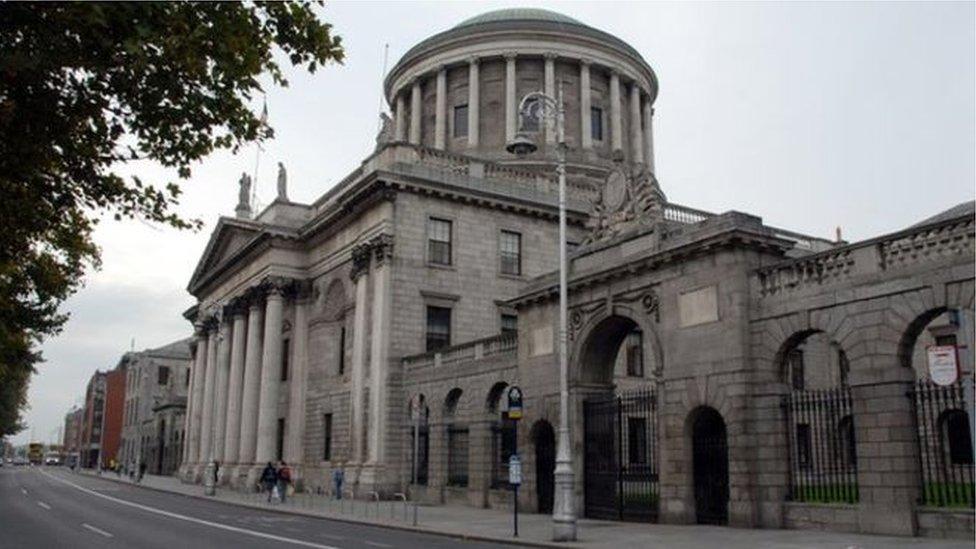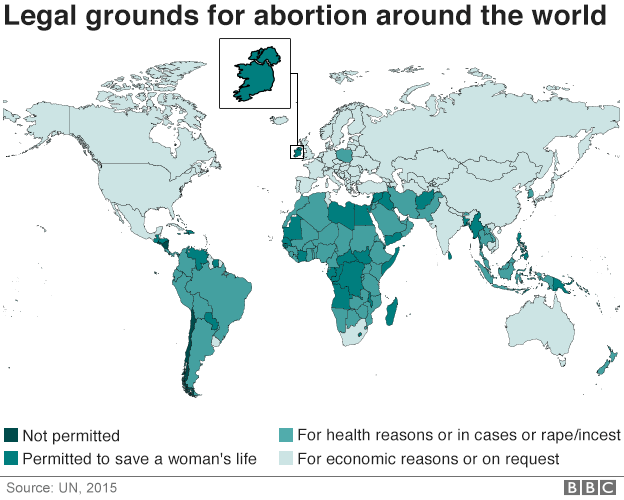Irish court rules on rights of 'unborn'
- Published

The judgment was called 'lengthy and complex'
The Supreme Court in Ireland has ruled that the "unborn" has no rights under the Irish constitution, other than the right to life in the Eighth Amendment.
The controversial piece of legislation, which effectively bans terminations, grants equal rights to the unborn and the mother.
It is due to be the subject of a referendum later this year.
Currently abortions are only allowed if the woman's life is at risk by continuing the pregnancy.
They are not permitted in cases of rape or incest, or when there is a foetal abnormality and thousands of women travel abroad for a termination every year.
The Irish government had appealed a High Court finding that the unborn had constitutional rights beyond the right to life, RTÉ reports., external
The judge said the judgment was lengthy and complex.
'Unanimous'
But he said it had been possible to reach a consensus on the issue and the decision of the seven-judge court was unanimous.
The court found the unborn did not possess inherent constitutionally-protected rights other than those expressly set out in the Eighth Amendment.

The judgment comes just two weeks after the case was heard urgently, in advance of the planned referendum on repealing the amendment.
It should mean that the government can now go ahead with its plans to hold the referendum at the end of May.
Irish Health Minister Simon Harris said he now intended to bring forward the final wording on the referendum.
"I look forward to people having their say on this very important issue," he said.
Allow X content?
This article contains content provided by X. We ask for your permission before anything is loaded, as they may be using cookies and other technologies. You may want to read X’s cookie policy, external and privacy policy, external before accepting. To view this content choose ‘accept and continue’.
The background to the case is that a Nigerian man, whose Irish partner was pregnant when proceedings began, wanted the minister for justice to revoke a deportation order made against him.
He argued that the unborn child had rights, enshrined in the constitution, including the right to the care and company of a parent.
But the government's case, which was upheld, was that those rights only took effect at birth.

Abortion in the Republic of Ireland
The Republic of Ireland currently has a near total ban on abortion.
Terminations are not permitted in cases of rape or incest, or when there is a foetal abnormality and thousands of women travel abroad for a termination every year.
The eighth amendment to the Republic's constitution, introduced in 1983, "acknowledges the right to life of the unborn".
However, there have been significant challenges and changes to the law in recent years.
A campaign to liberalise abortion gathered momentum in 2012, after Indian woman Savita Halappanavar died in a Galway hospital after she was refused an abortion during a miscarriage.

Savita Halappanavar died after a miscarriage in University Hospital in Galway in October 2012
The following year, legislation was passed to legalise abortion when doctors deem that a woman's life is at risk due to medical complications, or at risk of taking her life.
Twenty years before Mrs Halappanavar's death, a 14-year-old rape victim was initially prevented from travelling to England to terminate her pregnancy.
It became known as the X Case, as the girl could not be named to protect her right to anonymity.
The 1992 ban on travel was later overturned by the Irish Supreme Court.
A referendum approved a further update to the constitution, stating that the eighth amendment did not restrict the freedom to travel to another state.